I’m sure many business owners find themselves in the unenviable position of having to hire new staff members to perform search engine marketing tasks they have little understanding of.
It doesn’t help there are no degree level SEO training courses, in fact ALL Search Engine Optimization certification/qualifications are from businesses who have made the training course and certification up. The course material will be based on what THEY believe is important: most of what’s taught will be guesswork, some of it wrong!
The above is a worthless SEO training certificate I created with a free tool. Don’t be fooled by a certificate or diploma like the one above, it doesn’t mean anything. Doesn’t matter what an SEO agency or digital marketing agency say they have SEO certificates in, it’s made up.
The Value of SEO Training Certification
For example I was checking out the “SEO Qualifications” Google SERP and in the top 10 is the site Reed which has a section listing 398 SEO courses. The courses range in price from as little as £10 up to £4,350: what do you think a £10 training course will be worth to a business owner looking to hire a skilled SEO expert!
One of the most popular Reed SEO courses is apparently the Diploma in SEO and Digital Marketing Course for only £19!
It’s an online self-paced course which takes 64 hours to complete.
It has a huge list of subjects to study (course material), here’s a snippet from the “Course Curriculum” > “SEO Basics” section:
What Is Search Engine Optimization?
Search Engines That Use SEO
Using SEO In Website Text
Using SEO For Google Ads
Using SEO For Article Marketing
Using SEO In Press Releases
Using Longtail Keywords
Using Google To Discover The Best Keywords
SEO For Video Ads
SEO In Photos
Blogging With SEO Marketing
Using A SEO Company
I’ve not seen the course material, but would be concerned at “Using SEO For Google Ads” and “SEO For Video Ads” (you don’t SEO ads) and “SEO In Photos” (guess that’s Image optimization).
My biggest concern is to pass the Diploma in SEO and Digital Marketing Course it would appear all the student has to do is complete an online 30 minute multiple choice exam with only 40 questions: a pass mark of 60% (24 out of 40 multiple choice question correct) gets the student a diploma!
If the student fails the exam they can resit for £3.99.
I’m not suggesting all SEO training is like this, but since there’s no industry standard SEO qualifications there’s no way to know if a potential employees qualifications have any value. Although I’ve not studied a Moz SEO course, if I were going to trust a qualification it would be an SEO training course by Moz.
To make matters even more confusing, anyone can describe themselves as an SEO Expert, Digital Marketing Agency, Social Media Guru, SEO Agency etc… I studied a Bsc in Molecular Genetics at University, I’ve never studied even a single course in anything even remotely related to SEO, but describe myself as an SEO consultant and SEO expert. I’ve made a good living from SEO for over 15 years.
Hiring Trained Marketing Professionals
Good luck hiring skilled marketing professionals with SEO qualifications, get it wrong and they could seriously damage your website/brand!
Below is a cautionary tale regarding hiring the wrong people to manage the online marketing of a business website and a few tips for weeding out potential candidates who do not have a clue and will cause more harm than good.
It All Started With a Website SEO Review
In September 2016 (~16 months ago) I published a website SEO review for a Brighton based business called Languagenut, see the Languagenut Review.
I regularly SEO review websites, but rarely publish the results online: usually I look at a business site and tut loudly to myself at the large number of marketing mistakes :-)
I published the Languagenut review because it’s a multilingual site (dozens of languages) using hreflang tags incorrectly (they were broken: I don’t see that very often) and my eldest son (software engineer/computer programmer) works for Languagenut: I have a vested interest in Languagenut’s success.
If Languagenut had a decent SEO specialist on staff they’d fix all the SEO mistakes I provided at NO cost.
About 9 months after publishing the SEO review Languagenut was looking for new online marketing staff and I was interested in working on the SEO side of the business. I created a private follow-up SEO review via email as a sort of “job pitch”.
It didn’t pan out, I’ve never worked with or for Languagenut and you can tell the marketeers they hired to optimize the site etc… (both historically and now) hasn’t done much (anything?).
Importance of Trained Marketing Professionals
If you read the Languagenut SEO Review you will see there’s a fair amount of actionable information and I listed more issues via a 3,000+ word email covering multiple SEO/marketing/branding and possible cyber security issues. Plus a further 3,000+ word document detailing tests of their newly created Language app software which was in the bug testing phase at the time.
I wouldn’t normally put this level of effort into a pitch, but it would have been nice to work on a project with my eldest son.
Note: Nothing I posted at the above URL or below is ‘insider’ information, it’s all publicly available (for free) if you have the research skills and SEO understanding.
You would think with the detailed expert information provided (for free) the Languagenut website would have improved significantly by now (January 2018), but the opposite is the case, it’s got worse, much worse!
This shows why SEO training of marketing professionals and/or hiring the right people for an SEO/marketing task is so important!
Hire highly experienced/skilled staff, pay for SEO training or don’t be shocked at simple mistakes and a lack of results.
For the record there’s nothing wrong with the Languagenut software product, in my tests I found plenty of bugs (was pre-release), but it’s something my wife and I might have used 15+ years ago when we home educated our kids. The issues is the SEO and online social media marketing, it’s complete pants, total amateur hour!
Review of Languagenut’s SEO Issues
In my September 2016 Languagenut review I detailed various hreflang tag issues (hreflang tags are set to indicate there’s multiple language versions of a webpage), in brief for hreflang tags to work they ALL have to be set correctly.
The Languagenut site at the time had over 60 hreflang tags on most webpages and they didn’t match all 60 URLs. Get one hreflang tag from a set wrong and Google ignores them all and I didn’t find a single webpage on the Languagenut site with the correct hreflang tags set!
In 2016 Google was ignoring all the hreflang tags.
9 months later all the hreflang tags had been removed (not fixed, deleted), so we now had a website with multiple language versions with no indication the site is multilingual. To be more precise I believe someone has tried to manage the multilingual nature of the site with an incomplete set of geolocation data: country (IP based) specific 302 redirects, which is the WRONG way to tackle a multilingual website, to Google this could appear to be cloaking!
Proper implementation would be finding the Languagenut site via a Google search (any version of Google) and Google redirects the user to the correct language version of the webpage found via a Google search: currently it doesn’t work that way.
Try visiting http://www.languagenut.com/ using different IP addresses (find a free proxy to emulate visiting from different countries), the multilingual implementation is haphazard to say the least. Load the home page from a Swedish IP address and you are redirected to a completely different domain, the multilingual implementation is a nightmare, whoever did this does not understand SEO or even the limitations of trying to manage visitors via geolocation data!!!
It would appear** for countries Languagenut consider important they’ve setup specific home page redirects to a country specific domain (for example German and Swedish IPs redirect to different domains), but for some IP’s Languagenut hasn’t bothered and the ‘home page’ loads with contact information (try a Chinese IP address: see screenshot below).
** Take into account I have no more access to the Languagenut site than you do, so some of what I write is educated guesswork.
Trying to manage visitors this way is fraught with problems, you could live in the UK, but if the IP you connect from isn’t in the list you get what a Chinese visitor sees above! Note the text isn’t in Chinese, so a Chinese visitor gets an English webpage with no way to the rest of the site!
The only links which can be reached while viewing the site from China on the weird contact home page is the Privacy page and the Signup links. The Signup link takes you to https://resources.languagenut.com/resources/#/SignUp which doesn’t load correctly (only the background loads): I know why it doesn’t load, the URL is missing a variable (“?package=8“), presumably the number represents a package for a particular country and they haven’t set one for China (or a default package variable).
Loading https://resources.languagenut.com/resources/#/SignUp?package=8 from a Chinese IP works like you are in the UK, so looks like the IP redirection is ONLY for the home page! Access internal webpages directly like http://www.languagenut.com/en-gb/newcomers/ they load normally (no redirect).
It’s the weirdest setup I’ve encountered as an SEO consultant and perfect for showing how much mess an unskilled/untrained staff member can achieve!
If the Languagenut site actually ranked for anything (it doesn’t), this setup would risk SEO rankings: or maybe it has damaged search engine traffic which is why there’s no obvious Google SERPs.
Doorway Pages
To make matters worse whoever worked on the SEO of the Languagenut sites content has turned multiple sections of the site into doorway pages!
Since the hreflang tags (or equivalent implementation) isn’t working, Google is indexing many parts of the site like it’s not a multilingual site AND the different language versions of the site have been modified (title tags for example) to target different SERPs.
These five URLs for example are the same content, but with country specific differences:
- UK: http://www.languagenut.com/en-gb/newcomers/
- USA: http://www.languagenut.com/en-us/newcomers/
- Canada: http://www.languagenut.com/en-ca/newcomers/
- Australia: http://www.languagenut.com/en-au/newcomers/
- New Zealand: http://www.languagenut.com/en-nz/newcomers/
Corresponding title tags:
- UK Title: Languagenut Newcomers | EAL & EFL for the Whole World
- USA Title: Languagenut Newcomers | English Language Learning
- Canada Title: Languagenut Newcomers | Digital Printable ESL Resources
- Australia Title: Languagenut Newcomers | Digital Printable ESL Resources
- New Zealand Title: Languagenut Newcomers | Printable Digital ESOL Resources
Even though they are pretty much the same content (English Language version of the webpage with different currencies) they are targeting derivative SERPs via the title tags.
This LOOKS like the very old black hat SEO technique of creating lots of entry points to a site (doorway pages) which add no value for the visitor and risks a Google penalty.
Google’s description of doorway pages
Doorways are sites or pages created to rank highly for specific search queries. They are bad for users because they can lead to multiple similar pages in user search results, where each result ends up taking the user to essentially the same destination. They can also lead users to intermediate pages that are not as useful as the final destination.
Here are some examples of doorways:
Having multiple domain names or pages targeted at specific regions or cities that funnel users to one page
Pages generated to funnel visitors into the actual usable or relevant portion of your site(s)
Substantially similar pages that are closer to search results than a clearly defined, browseable hierarchy
It would be pushing it if the hreflang tags were in place, but this could appear to be deliberate blackhat SEO to Google!
The Canadian one for example is targeting “Printable ESL Resources”, there aren’t any printable resources on that webpage: it’s misleading and unprofessional from a brand perspective!
I warned Languagenut of this important issue via private email and nothing changed!
As a side note I’ve never used the exclamation point ! as many times in one article as I have in this Languagenut review!
How Languagenut Should Work
IF the hreflang tags were set correctly all the webpages above (and any others with the same content) could have almost identical content other than the country specific parts: different prices/currencies, different country specific spellings (color vs colour etc…), different words for each country (for an educational site Key Stages are appropriate for UK content, but not for US content).
Google users would be automatically redirected to the correct version, since I’m in the UK if I visited any of the above webpages from a Google search I’d be automatically redirected to the UK webpage: that’s what hreflang tags are for.
The above is just a small sample of the SEO and marketing mistakes made on the Languagenut site, I don’t think they made any of the suggested SEO or social media account changes to fix important issues!
Even potential cyber security issues including out of date WordPress Plugins aren’t resolved: in July 2017 they were using the Yoast WordPress SEO Plugin v4.6 (released April 11th, 2017) and are still using Yoast v4.6 today (January 2018) despite my warning about security, they have missed over 30 Yoast plugin updates!!!
Regular updates is basic cyber security, someone should be tasked with updating everything the website uses on a regular basis (at least monthly and ideally weekly) to avoid leaving the site potentially vulnerable for months at a time.
Whoever is working on the Languagenut website doesn’t have a clue what they are doing.
The funny thing is I made the pitch July 2017 and at the time I was willing to work full-time on the site throwing my entire network of domains and social media accounts behind it’s online promotion for around £60,000 a year: a bargain for someone with 15+ years online marketing experience.
I assume Languagenut have several staff members working on online marketing/promotion, they are probably paid between £20K-£35K annually each (that could be over £100K a year between them) and they’ve achieved very little over the past 16 months.
What a waste of time and money.
More SEO and Branding Damage
For some inexplicable reason someone working for Languagenut deleted ALL the Blog content without having a replacement plan. The Blog content wasn’t very good, but deleting it left the site for months with coming soon posts which is so unprofessional and brand damaging!
Even now the UK Blog has only 4 poorly optimized webpages.
There’s a page with a link from the main Blog page with title “Christmas is Coming”, screenshot below.
Would you click that “Read More” link if you were looking for Printable Christmas Language Resources or would you assume it’s some sort of Happy Christmas message and not bother?
All four pages are the same, sets of free printable language resources for schools (the resources look quite good), but the marketing/SEO of the content is atrocious. There’s so much they could do with that content (the printable resources), I’d have targeted hundreds of relevant SERPs.
It gets worse, Languagenut have copied these Blog articles across multiple country specific Blogs (/en-gb/, /en-us/, /en-au/ etc…) and because there’s no hreflang tags the copies are duplicate content.
And again they look like doorway pages, someone has made minor modifications to the content so each version is slightly different, this is blackhat SEO, highly unlikely to be a mistake, see example text below!
UK example text:
There’s a frosty chill in the air, mince pies are appearing on shop shelves and the TV schedule is filling up with nostalgic favourites…
US example text:
There’s a frosty chill in the air, Michael Buble’s Christmas album is being played in every store and the TV schedule is filling up with nostalgic favourites…
As a side note they didn’t change favourites (UK spelling) to favorites (US spelling) in the US version. If they had the hreflang tags changing spellings is the correct SEO and user friendly action.
Also look at the order of the numbered resources, they’ve been reordered to make the content appear unique!
That’s pretty clear cut SEO SPAM and could get the site banned from Google. This is out of date low quality blackhat SEO from 10 plus years ago, whoever did this is taking major risks and hasn’t a clue about whitehat SEO techniques!
YouTube Videos Deleted
They also deleted all their YouTube videos, but left the empty video playlists in place, it’s been like that for over 6 months, see screenshot below.
This looks so unprofessional from a branding perspective and messes up any webpages (like my Languagenut review) which embedded the YouTube videos (really annoying).
Imagine if you wrote a positive Languagenut review (linking to their site, passing link benefit) and used their YouTube videos heavily and now find a not found screen (see above screenshot) on your review, you might just delete the entire Languagenut review since there’s no replacement videos.
Who deletes all the videos from a YouTube account with no replacements?
Deleting the Blog content and the videos looks like marketing sabotage! Whoever did this needs to spend a few months studying basic marketing.
Low Twitter Follower Growth
The Languagenut Twitter account has roughly the same number of followers (7,000 to 8,000) as they did just under a year ago. In March 2017 the account had 7,100 followers, in October 2017 it was 7,500 follower and currently (January 2018) they have just under 7,700 followers.
In 10 months the Languagenut Twitter account @languagenut has only increased by ~550 followers, roughly 55 new followers a month or 2 new followers a day: that’s really, really poor Twitter growth management. Clearly they aren’t actively trying to encourage Twitter follower growth.
To put things into perspective I created a new language relevant Twitter account @WoWLanguages (planned to use it to promote Languagenut content if I worked with them) on August 12th 2017 (5 months ago), the account currently has over 8,500 followers: that’s roughly 1,700 new followers a month or 50-60 new followers a day. I’ll keep growing the account and use it to promote any SEO clients in a relevant niche.
Update: 20th February. The Languagenut Twitter account has 7,708 followers (increase of 30 followers, less than 1 new follower a day!) vs my WOW Languages Twitter account has 11,601 followers (increase of ~3,100 followers, around 90 new followers a day).
That’s not my only newish Twitter account, some of my recent accounts have over 10,000 followers.
To make the most out of Twitter I’m afraid you have to work on it at least 20 minutes a day, otherwise there’s not much point using Twitter. No such things as “if you build it, they will come” :-)
Languagenut is a really good (bad) example of how NOT to perform online marketing on an important business website, which is why I HAD to use it as an example, it’s the worst I’ve ever seen in some respects.
I very much doubt even the best SEO training courses would prepare a new employee for this level of marking and brand damage! I feel sorry for whoever is supposed to deal with this mess!
Hiring New Online Marketing Staff
Finally we get to how to find staff to manage online marketing, or at least how to weed out potential candidates who lack relevant online marketing skills/experience and will make a mess like I’ve described above.
If you want highly skilled and experienced staff (people like me) it’s going to cost you a lot more than hiring a graduate right out of University or a random SEO consultant/SEO agency with a flashy website you found online with a few worthless digital marketing course certificates/diplomas.
The skills required to manage website optimisation and social media accounts take years to master, you can not expect an inexperienced employee to even manage an important Twitter account and within a couple of weeks understand how to create optimised Tweets and safely build a following.
Here’s a few things to look for with a potential candidate.
Do they own a website, if so run it through the free Google PageSpeed Insights Tool.
The PageSpeed Insights Tool is provided by Google to check a website for some of the basic SEO issues related to pagespeed and usability on Mobile and Desktop devices. If your potential candidate says they are an SEO expert expect a decent score (in the green) for their website, if they haven’t optimized their own site to run fast, ask them why not?
Google uses page speed as a ranking factor, it’s important. The screenshot below is the results for the home page of this site, note it’s in the green.
Also run their site through the Google Chrome LightHouse SEO tests. LightHouse is a free tool that’s built into the Google Chrome Browser and performs a bunch of speed and similar tests. Want even more information use other popular website speed testing tools.
Check relevant social media accounts, if you want them to manage/advise on your Twitter account have a look at their personal and/or business Twitter account(s). If they don’t have a Twitter account or their follower numbers are low, how will they help with your Twitter reach?
Twitter provides free analytics data, ask the potential candidate for a screenshot of their results, if they won’t provide a screenshot assume their results are poor. Take a look at my article How to Build a Popular Twitter Account Fast which has a few Twitter analytics screenshots from my newer accounts. A recent screenshot below from one of my politics Twitter accounts:
If the candidate worked for an SEO agency (or are an SEO agency) check out the agencies Twitter account, if they can’t build a Twitter account with at least 5,000 followers I wouldn’t seriously consider them.
Below are a selection of my Twitter accounts (I have others in different niches). It doesn’t take that long to build a Twitter account with 5,000+ followers, but it does take working on an account pretty much everyday and to build followers fast is risky: an experienced candidate will understand the Twitter limits (they are very easy to break) and will understand how fast an account can be grown without risking a ban.
Personal Twitter Account
SEO Gold Business Twitter Account
Marketing Twitter Account
Language Twitter Account
Programming Twitter Account
Bitcoin Twitter Account
Politics Twitter Account
Do they have a LinkedIn profile, if so how many connections? If they have a lot of connections, suggests they know how to connect with similar minded people online. For example My LinkedIn Profile has over 7,500 connections.
Do they have a FaceBook account, if so how many friends do they have? If a high number (in the thousands) it could suggests they know how to connect with useful people: online connections can help get a marketing campaign up and running at no/low cost. For example My FaceBook Account has roughly 3,500 friends.
By looking at a potential candidates online social media profile it will indicate how much experience they have on each social media platform. Having high follower number etc… on social media doesn’t necessarily mean they know what they are doing (you wouldn’t hire Donald Trump to manage your business Twitter account), but it’s at least a positive signal they understand how social media networks work.
Good luck in your hunt for high quality online marketing candidates, you’ll need it.
David Law



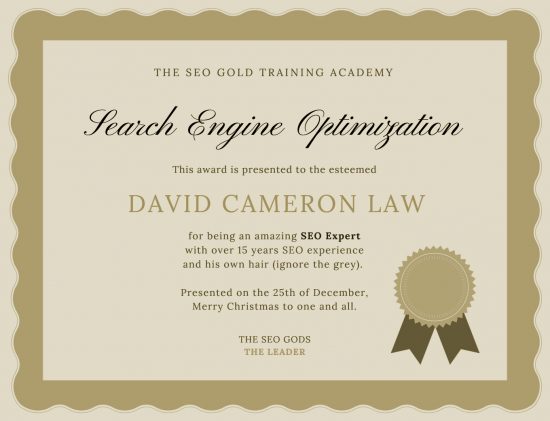


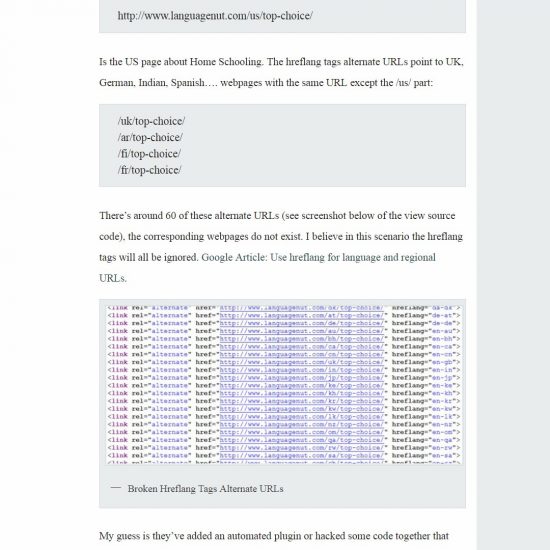


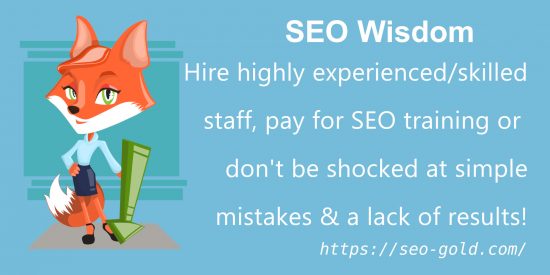
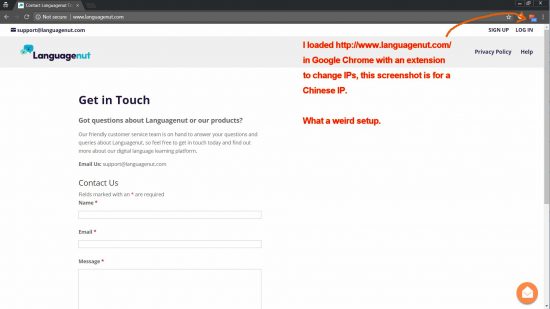

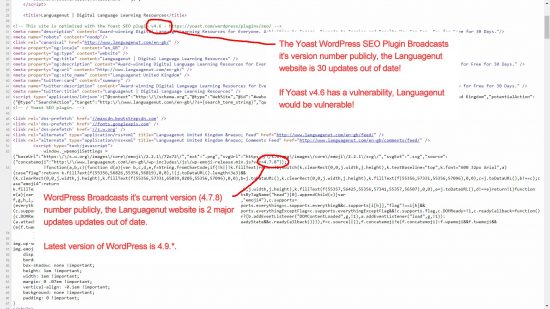
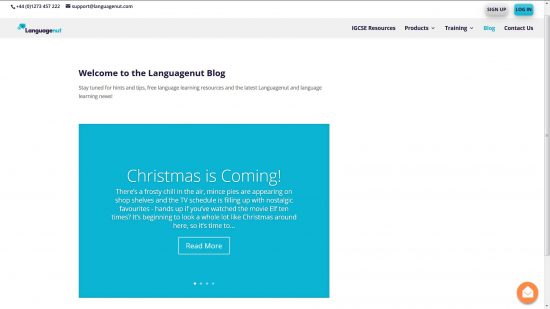
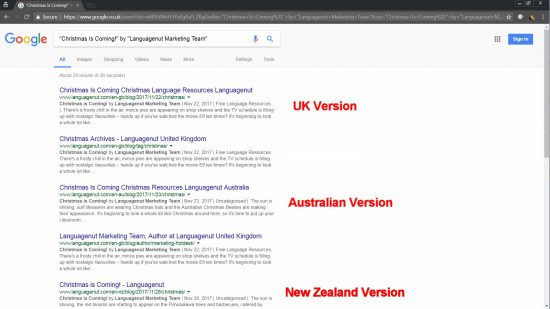
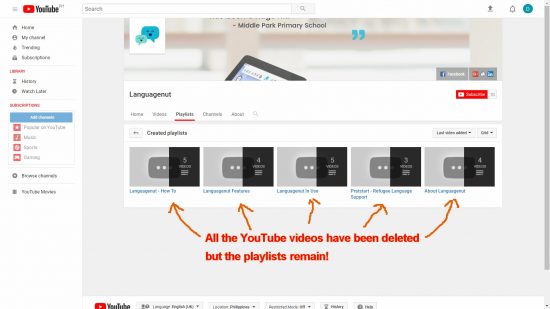

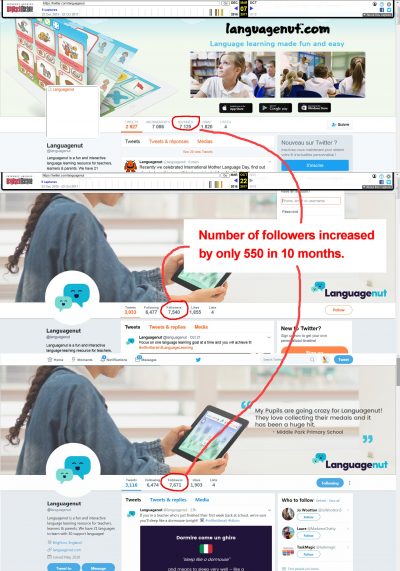

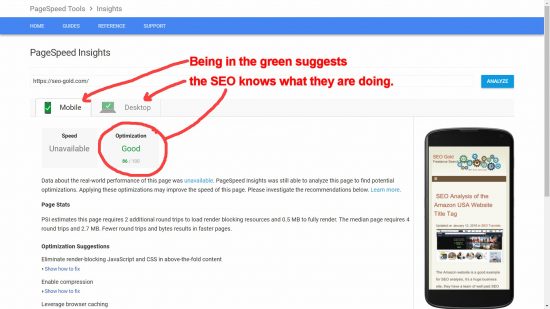














I work for a company a lot like Languagenut, I’m solely responsible 4 SEO and social media account marketing, my boss expects results but my background before this job was in general marketing which is a different toolbox of skills and i dont know what I’m doing.
Thanks David for posting about your experience with Languagenut, I’m learning a lot from your SEO reviews, PLEASE keep them coming.
Glad to hear you are finding my SEO articles useful, since I’m looking for new SEO clients I’ll be adding more tutorial type content to the site as SEO client bait :-)
Sounds like you are struggling to cope with your SEO role in the business?
It’s not unusual for marketing staff members to be given search engine marketing/social media marketing on top of their offline marketing tasks in a mistaken belief marketing is marketing.
Even within online marketing there are different niches requiring different skill sets, I have masses of experience in technical search engine optimisation (optimising code, site structure, page speed etc… which means understanding advanced HTML, CSS, PHP, server settings…), but have very little experience in email marketing: I know more than the basics, but calling myself an email marketing expert would be pushing it a LOT :-)
I would assume an employer with a highly skilled SEO expert wouldn’t assume the employee is also highly skilled at offline marketing (TV ad campaigns etc…)! Interesting some assume those good at offline marketing will also be good at online marketing.
I find one of the worst things an employer can do is look for online marketing staff with relevant experience in the businesses niche, but little experience in the online marketing itself.
For example you would think for a language based business like Languagenut employees who speak multiple languages is a huge plus, BUT it shouldn’t trump search engine marketing skills/experience if the main task is multilingual SEM. They might be able to create content etc… in more than one language, but if it’s not search engine optimised and they don’t know how to promote it online and grow social media accounts etc… the content won’t be seen by potential customers.
If I ran a business and was hiring new SEO/SEM/SMO staff I wouldn’t consider anyone without 5+ years experience working in SEO/SEM/SMO and I’d expect to see proof of experience (optimised websites, Twitter accounts etc…).
I would only consider hiring low skilled candidates IF there was at least one highly skilled staff member with a proven track record with the ability to train staff to a decent level. Otherwise it’s a waste of time and money, the new employee(s) will be fumbling around in the dark guessing what may or may not work to attract traffic etc…
David Law
A very useful breakdown of how it can go wrong for a business hiring online marketing talent.
HR departments would be wise to check for SEO red flags
1. SEO candidates guaranteeing Google rankings. There are no guarantees in SEO. Avoid these candidates.
2. They are approved by Google or SEO regulatory body. Google never approves SEO’s there aren’t any regulatory bodies.
3. They use search engine directory submission services. An outdated SEO technique. SEO changes frequently, good candidates will be current.
4. Their SEO and marketing methods are proprietary, secret and cannot be shared in advance. Transparency is a prerequisite in a potential candidate.